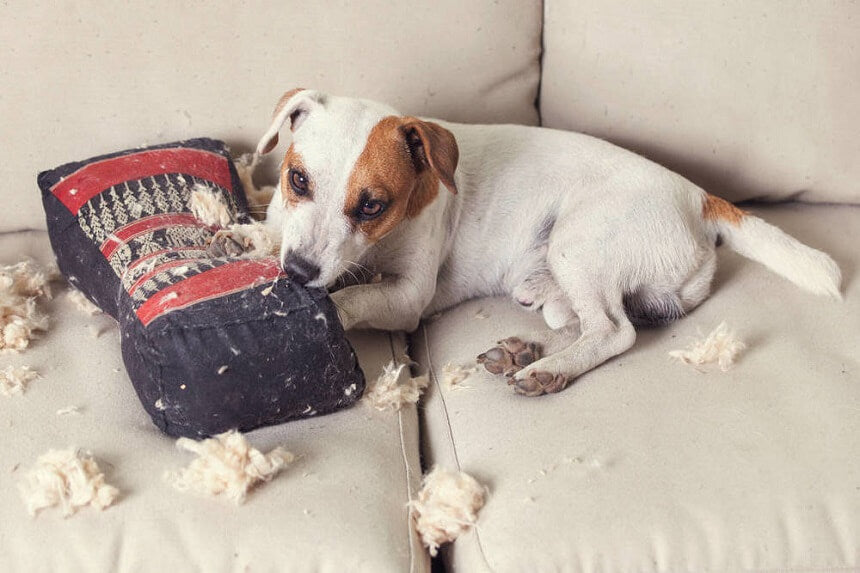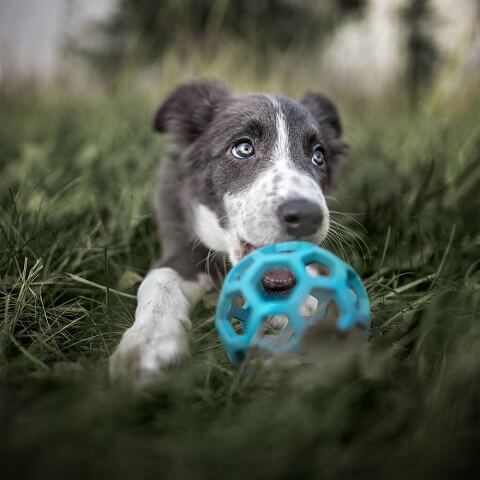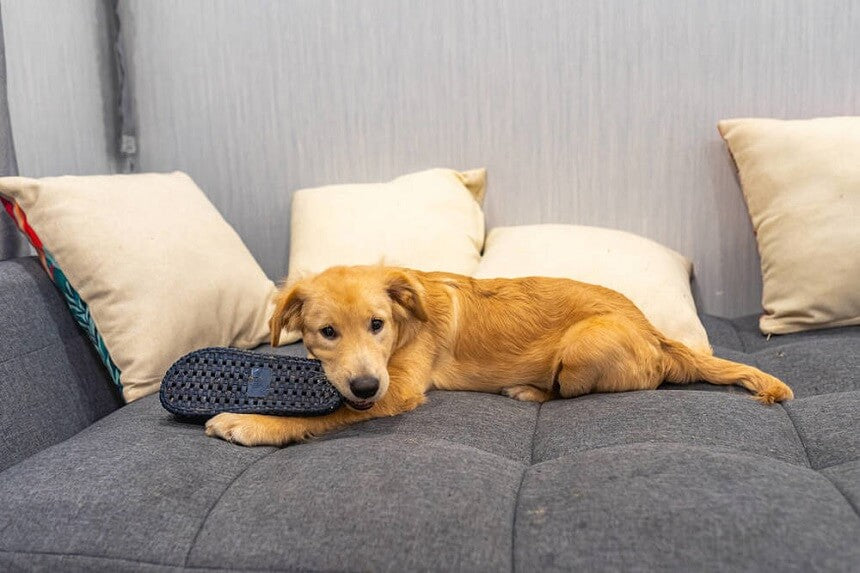Understand How To Stop Chewing In Puppies? Before You Regret
While puppies are usually considered adorable, a puppy chewing everything in sight can quickly become annoying. Unfortunately, puppy chewing is something that many new pet parents tend to neglect or inadequately prepare for, and that can make this destructive time in your puppies' life even more frustrating.
And although it's destructive, puppy chewing is completely normal behavior and can easily be compared to how human babies put things in their mouths to get more information about the world around them. It doesn't need to be harshly stopped, only redirected.
But since dealing with your destructive puppy takes so much of your time and energy, it can be very hard to decide on a strategy for what to do to stop this destructive behavior, even when you know that your dog needs to be trained out of it early to prevent future problems.
Quick View
Why do Puppies Chew on Everything?
Wondering why do puppies chew on wood, shoes, socks, etc.? Puppy chewing is a common problem, but not all dog breeds are equally susceptible to it. Certain pups chew more than others, and dog breeds that chew the most include beagles, golden retrievers, and jack russell terriers. Some reasons for puppy chewing are:

· Separation Anxiety
Separation anxiety is a common reason for destructive chewing. Being pack animals, dogs don’t really like being alone and can become anxious when left to themselves. This anxiety can then manifest as destructive behavior like chewing furniture, carpets, and nearby objects.
· Alluring Odor or Taste
Your dog may also choose to chew certain objects because their smell or taste is appealing to it. Puppies are most attracted to human smells, making shoes in particular especially appealing to them due to their intense smell. Other smelly objects like socks and shirts are also appealing to dogs.
· Texture
Certain textures appeal to dogs' instincts and make them more prone to chewing. For example, the texture of leather is particularly appealing to dogs, as they are natural predators and associate it with animal hide. So if your puppy likes to chew on your leather shoes, couch, etc., this is likely why.
· Teething
Teething is a painful process for puppies, and chewing can help relieve some of this pain. Puppies also chew more when teething, as they are naturally curious and have an intense desire to explore the world with their newly acquired teeth.
· Hunger
Another reason for your puppy chewing anything it can get its paws on can be hunger. Puppies need to be fed multiple times a day, and if your puppy gets hungry while you're gone, it may start chewing on non-food objects that smell like food.
· Frustration
Dogs also tend to chew when frustrated. Such chewing is likely a means to get all their excess energy out, and since puppies are particularly high-energy, they are especially prone to this when not getting sufficient mental and physical stimulation.
· Boredom
Some puppies may also choose to destructively chew on everything around them just to have something to do. Like humans, dogs are social animals that need attention and new and exciting toys to play with. In the absence of this social stimulation, dogs can get incredibly bored.
How to Stop Puppies from Chewing: 8 Steps
Now that you understand why do puppies chew, you can start working on stopping puppy chewing. Just provide appropriate chewing outlets as you eliminate inappropriate ones and be consistent and calm, as punishing the puppy will only worsen the situation.
To effectively stop a puppy from chewing on everything, follow the steps below.
1. Stay Alert
The first step to stopping puppy chewing is staying alert, so you can stop it when it happens. Puppies live in the moment, and if you scold your puppy after the deed is done, it is unlikely to understand what it did wrong.
2. Divert Attention
When you do catch your puppy in the act of chewing on an inappropriate object, interrupt your destructive puppy calmly but firmly. Give it something appropriate to chew on and praise it when it chews on that instead.
3. Set Clear Boundaries
Don’t expect your puppy to be able to tell what it can and cannot chew on. Set clear boundaries, and when getting your dog designated objects to chew upon, don’t give it anything that resembles something you don’t want it chewing on.
4. Limit Access to Chewable Items
You should keep a strict eye on your dog to prevent chewing, but that’s not always possible. To minimize puppy chewing in such a scenario, limit the dog’s access to things it’s likely to chew on. Keep shoes out of reach, don’t leave socks lying around, and keep your puppy in a crate or sectioned off in a small room if possible when leaving it alone.
5. Leave your Scent Behind
If your puppy is the anxious type, give it an object coated with your scent to help calm it down when leaving it alone for extended periods of time. To do this, roll the object between your hands to transfer your scent to it. You can do this with a ball, fake bone, or beloved toy.
6. Employ Safe Chew Toys
Dogs chew toys designed with dog safety in mind are great for teething puppies and can help end destructive chewing. Some of the best chew toys for puppies are hard rubber kongs, nylon bones, and durable soft toys. Why not choose Kuoser dog chew toys. If you click here, you’ll see there are chew toys and a lot of other types of toys for dogs available.

7. Use Chew Deterrents
If your puppy insists on chewing the things it shouldn’t even after being scolded and given access to safe chew toys, consider trying a chew deterrent for dogs to make inappropriate objects unappealing. Be sure to supervise your dog when first trying a chew deterrent, and keep reapplying to maintain effectiveness.
8. Exercise
As puppy chewing is often a result of frustration, boredom, and anxiety, exercise is one of the most effective methods of stopping puppy chewing. Just make sure your pup is getting sufficient exercise every day and provide mental stimulation with sniff toys and puzzles.
How Long Does the Puppy Chewing Stage Last? (at What Age Are Puppies Most Destructive?)
Puppies get their milk teeth at about 3 to 6 weeks of age and begin losing them at about 4 months of age in favor of adult teeth. This teething period closely coincides with the puppy chewing period and usually lasts till about 6 months of age.
Puppies are at their most destructive stage at around six to ten months of age and will chew anything ranging from pillows to carpets due to a strong urge to chew and bite. It is essential to divert their attention and properly train them at this age to prevent future issues.

Danger in Inappropriate Chewing
Inappropriate chewing is not only a highly destructive puppy behavior that leads to the destruction of personal property, it is also really dangerous for your puppy's health. Inappropriate chewing is associated with medical problems, which can be lethal if not noticed and treated immediately. Some dangers of inappropriate chewing are:
· Fractured Tooth
Chewing on hard objects like antlers or bones can fracture a dog’s teeth. Such fractured or cracked teeth are a quite common occurrence and prone to becoming infected and dead. An infection of the teeth is especially serious as it can affect and critically damage other parts of the body when left untreated.
· Gum Damage
Your puppy chewing on a hard or pointy object can also seriously damage its gums. This gum damage can be nothing to worry about or painful and lead to other oral issues like eroded gums, missing teeth, etc., in the long run.
· Choking
When a puppy chews on something inappropriate and easily destructible, it is also likely to ingest and choke on any smaller pieces that break off from the main body. Certain materials like rawhide can make your dog especially vulnerable to this.
· Intestinal Irritation or Blockage
Swallowing broken-off pieces of the object being chewed can cause your puppy to experience digestive problems like intestinal irritation. Swallowing chunks is also dangerous as the swallowed fragments can get stuck in your dog's intestines and block them, becoming fatal if not removed surgically.
· Contamination
Another problem with a puppy chewing on stuff unsupervised is that it might unintentionally ingest something toxic or infectious, putting its health at risk. To minimize this, dog proof your home to the best of your ability and maintain good cleaning habits.
Final Thoughts
In addition to being destructive for the pet owner, chewing can also seriously harm your puppy. Rigorous chewing on inappropriate objects can result in cracked teeth, gastric irritation, and choking. So it is best to stop destructive chewing early on to maintain your puppy’s health and promote healthy habits.
Stopping puppy chewing relies heavily on consistency and positive reinforcement. Punishing a destructive puppy for chewing should always be avoided and is one of the worst things you can do, as the anxiety from being punished can create a hard-to-break cycle.
Hope this article helps you put a stop to your puppy’s destructive chewing. Got tips for making a puppy’s destructive phase easier to deal with? Share them in the comments down below.
READ NEXT:


Leave a comment